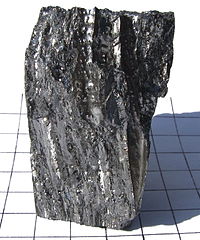
Photo from wikipedia
Abstract para‐Hydrogen‐induced polarization (PHIP) is a method to rapidly generate hyperpolarized compounds, enhancing the signal of nuclear magnetic resonance (NMR) experiments by several thousand‐fold. The hyperpolarization of metabolites and their… Click to show full abstract
Abstract para‐Hydrogen‐induced polarization (PHIP) is a method to rapidly generate hyperpolarized compounds, enhancing the signal of nuclear magnetic resonance (NMR) experiments by several thousand‐fold. The hyperpolarization of metabolites and their use as contrast agents in vivo is an emerging diagnostic technique. High degrees of polarization and extended polarization lifetime are necessary requirements for the detection of metabolites in vivo. Here, we present pulsed NMR methods for obtaining hyperpolarized magnetization in two metabolites. We demonstrate that the hydrogenation with para‐hydrogen of perdeuterated vinyl acetate allows us to create hyperpolarized ethyl acetate with close to 60 % 1H two‐spin order. With nearly 100 % efficiency, this order can either be transferred to 1H in‐phase magnetization or 13C magnetization of the carbonyl function. Close to 60 % polarization is experimentally verified for both nuclei. Cleavage of the ethyl acetate precursor in a 20 s reaction yields ethanol with approximately 27 % 1H polarization and acetate with around 20 % 13C polarization. This development will open new opportunities to generate metabolic contrast agents in less than one minute.
Journal Title: ChemistryOpen
Year Published: 2018
Link to full text (if available)
Share on Social Media: Sign Up to like & get
recommendations!